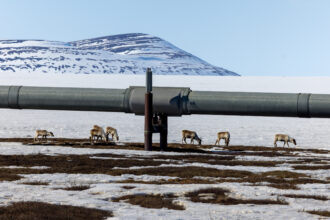By Matthew Berger
With the Senate Environment and Public Works Committee approving its component of the climate bill Thursday, attention can now turn to the five other parallel projects that will eventually come together as one comprehensive Senate bill.
When that will occur and what exactly might come of it are matters still largely left to speculation, but, with the Copenhagen climate talks now impending, details are increasingly beginning to emerge about the future of U.S. domestic climate legislation.
By sending their portion of the Clean Energy Jobs and American Power Act out of committee today, EPW joins the Senate Energy and Natural Resources Committee as the only two of the six Senate committees involved in the bill to finish their work.
"This is a step in the process,” said EPW Chairwoman Barbara Boxer (D-Calif.). “Our colleagues are all working toward a comprehensive bill; we will join them."
Republicans on the committee didn’t make that easy. They boycotted this week’s markup session on the bill, demanding a new, more in-depth analysis by the Environmental Protection Agency first, despite previous analyses by the EPA and an EPA representative appearing before the committee earlier this week — while the Republicans were absent.
Thursday morning, Boxer told the lone Republican present, ranking GOP committee member James Inhofe (R-Okla.), “I only regret you weren’t here when the EPA was here. … The analysis they did was unprecedented at this point in the process.”
She then put the bill to a committee vote without the minority party’s support, which under procedural rules meant that no amendments — from Republicans or Democrats — could be attached. The vote was 11-1, with no Republicans participating and the only opposition coming from Sen. Max Baucus (D-Mont.), who wanted his own amendments to be considered.
“The committee and Senate rules that have been in place during Republican and Democratic majorities are there to be used when the majority feels it is in the best interest of their states and of the nation to act,” Boxer said in explanation of her decision.
“We did it. We did it in accordance with the rules. We did it with dignity. We did it with passion and commitment.”
These congressional rules are beginning to play an increasingly central role in the prospects of Washington producing strong climate change legislation.
The need for 60 votes in order to avoid the specter of a filibuster has in particular slowed down those who saw the 2008 election as opening the door to climate legislation that was not possible under the Bush Administration.
While Democrats have 60 seats now, members from coal and industrial states perceived as likely to be hit hard by higher prices for fossil fuels still have to be brought on board, or a few Republicans will have to be persuaded to cross the aisle.
This means congressional proposals are already far weaker than the Intergovernmental Panel on Climate Change’s recommendations of cutting emissions 25 to 40 percent below 1990 levels by 2020. The House-passed American Clean Energy and Security (ACES) bill aims for a 17 percent reduction below 2005 levels by 2020, and the Senate bill, as it currently stands, aims for 20 percent below 2005.
Meanwhile, numerous concessions to industry groups, Republicans and skeptical Democrats have been included in both bills in order to give them a broader Congressional appeal.
The Senate bill’s emissions targets are expected to get weaker if and when it comes before the full chamber, and new nuclear reactors and increased offshore drilling appear likely to be included in any final draft. The Energy and Natural Resources Committee version included expanded drilling in the Gulf of Mexico.
Outside of the committee rooms, the bipartisan trio of Sens. John Kerry (D-Mass.), Joe Lieberman (I-Conn.) and Lindsey Graham (R-S.C.) announced Wednesday they will work separate from the current bill to create a proposal with the ability to draw in supporters from both sides of the aisle. To do so, they are expected to include many of those environmentally questionable elements.
Once all the pieces are in, Senate Majority Leader Harry Reid (D-Nev.) will meld them into a comprehensive bill. But when that might take place is very much up in the air.
Whether it’s before the U.N.-sponsored talks in Copenhagen, Dec. 7-18, seems highly unlikely, especially given Reid’s statement Wednesday that he would seek a new EPA analysis, as the EPW Republicans demanded, once a completed bill reaches the Senate floor. That analysis is expected to take five weeks.
Thursday, however, Reid’s stance appeared slightly more ambiguous.
The majority leader “believes that senators will want to see a new EPA analysis of the climate bill,” a spokesperson from Reid’s office said Thursday morning, following the EPW vote. “He will continue to work with the Senators who want to legislate on this important matter to make sure that EPA work is in hand for the debate.”
Even without the new analysis, the wait continues for the other committees’ portions of the bill.
Commerce Committee Chairman John Rockefeller, a Democrat from coal-reliant West Virginia a critic of the legislation, said Tuesday, “Some people are talking about not doing it until after the 2010 election.”
Of course, you can never be sure in the “vagaries of Washington,” said Tony Kreindler of the Environmental Defense Fund. “Nobody’s ruling anything out yet.”
If a bill does not reach the floor before Copenhagen, Kreindler predicts one will early next year. “I would expect fairly quick action at that point,” he said.
The inability of the U.S. to commit, domestically, to limits on greenhouse gas emissions prior to Dec. 7, however, is expected to weaken its ability to do so on the international level in Copenhagen. It may also weaken the ability and willingness of everyone else at the conference to reach a meaningful agreement.
During pre-Copenhagen negotiations this week in Barcelona, African representatives walked out of sessions Tuesday over a perceived lack of commitment by wealthy nations to sufficiently cut emissions.
The Senate is aware of the implications. At the EPW Committee meeting Thursday, Sen. Amy Klobuchar (D-Minn.) said that, despite her reservations,
“I’m voting this bill out committee because I want to show a signal to the rest of the world because we need a signal to the world that America wants to be a leader” in clean energy.
See also:
Oil Industry Applauds Senate’s ‘Clean Energy’ Bill
Key Senate Democrat Raises Questions about Climate Bill Emissions Cuts, Costs
Greenpeace Warns Obama: Congress is Undermining the Clean Energy Future
America’s ACES vs. UK’s Low Carbon Transition Plan
The Case for Letting Climate Legislation Evolve
(Photo: Francisco Diez / CC BY 2.0)
About This Story
Perhaps you noticed: This story, like all the news we publish, is free to read. That’s because Inside Climate News is a 501c3 nonprofit organization. We do not charge a subscription fee, lock our news behind a paywall, or clutter our website with ads. We make our news on climate and the environment freely available to you and anyone who wants it.
That’s not all. We also share our news for free with scores of other media organizations around the country. Many of them can’t afford to do environmental journalism of their own. We’ve built bureaus from coast to coast to report local stories, collaborate with local newsrooms and co-publish articles so that this vital work is shared as widely as possible.
Two of us launched ICN in 2007. Six years later we earned a Pulitzer Prize for National Reporting, and now we run the oldest and largest dedicated climate newsroom in the nation. We tell the story in all its complexity. We hold polluters accountable. We expose environmental injustice. We debunk misinformation. We scrutinize solutions and inspire action.
Donations from readers like you fund every aspect of what we do. If you don’t already, will you support our ongoing work, our reporting on the biggest crisis facing our planet, and help us reach even more readers in more places?
Please take a moment to make a tax-deductible donation. Every one of them makes a difference.
Thank you,












